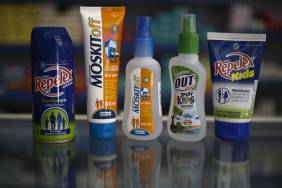w to choose the best sunscreen and bug spray for kids
 By Patricia Kozicka Lifestyle and Special Projects Reporter Global News
By Patricia Kozicka Lifestyle and Special Projects Reporter Global News
 ;
;“Kids have thinner skin and things can be absorbed more easily,” warned Jennifer Beecker, the national chair of the Canadian Dermatology Association‘s Sun Awareness Program.
Special rules for babies
That’s why Health Canada does not recommend putting either sunscreen or insect repellent on babies under six months. Citronella oil shouldn’t be applied on infants or toddlers either.
Instead, parents are advised to “use a mosquito net when babies are outdoors in a crib, playpen or stroller” and “keep babies under one year out of direct sunlight… never let them play or sleep in the sun.”
On children aged six months to two years, you’re able to use insect repellents containing only up to 10 per cent DEET. But don’t use it more than once daily. That limit should still give three hours of protection.
Order matters
Another important tip:
“Apply sunscreen first and then insect repellent,” said Beecker.
She explained that the skin absorption of the chemicals in the bug spray may be increased if it’s the other way around.
Health Canada also urges parents not to use products that are a combination of sunscreen and insect repellent.
WATCH: Natural alternatives to outdoor essentials like sunscreen, insect repellent

Sprays
Don’t spray either of the products on a child’s face — use your hands to spread instead.
In general, experts prefer sunscreen lotion over sprays (as practical as they may seem).
If you do use the spray, make sure to rub it in, “otherwise you’ll miss spots,” Beecker said.
Sunscreen ingredients
There have been concerns raised by some environmental groups over a common sunscreen ingredient — oxybenzone — being a carcinogen.
The claim, which Beecker said “is not based on any scientific evidence,” has been refuted by groups like The Skin Cancer Foundation and the American Academy of Dermatology.
“We do know that approved sunscreens are very effective at preventing skin cancer, which is the most common cancer in the world,” Beecker stressed.
Still, some parents are letting the unfounded concern prevent them from protecting their children properly.
WATCH: Some parents are saying no to conventional sunscreen and making their own

For people who are concerned about a sunscreen’s ingredients, or those who have sensitive skin, Beecker recommended looking for one that uses a physical (rather than chemical) barrier, such as titanium dioxide or zinc oxide.
You may also want to stay away from those containing fragrances, as some people can react to that.
“You have to be a bit of a label reader.”
And look for one that’s water resistant, if possible.
READ MORE: What you need to know about sunscreen
More bug spray regulations for kids
Here’s what else Health Canada considers appropriate when it comes to insect reppellent:
- Children aged two to 12: Up to 10 per cent DEET concentration may be used, applied up to three times daily. One application of 10 per cent DEET should be effective for three hours against mosquitoes.
- Adults and children over 12: Up to 30 per cent concentration of DEET may be used. One application of 30 per cent DEET should be effective for six hours against mosquitoes.